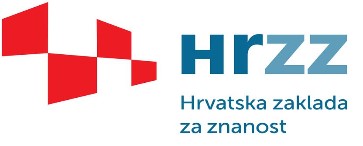Croatian Science Foundation

DeSPERADo: Depression, suicide and proteinopathy: elucidating the relationships between aggregation and pathological development
Project leaders: Prof. Nicholas J. Bradshaw (Rijeka), Dr. Katatina Kouter (Ljubljana)
Project associates: Bobana Samardžija (Rijeka), Maja Juković (Rijeka), Matea Kršanac (Rijeka), Prof. Rozi Andretić Waldowski (Rijeka), Aristea Pavešić Radonja (Rijeka), Ilijana Stanivuk (Rijeka), Andrea Montan (Rijeka), Simone Bernobić (Rijeka), Mohammad S. Hossain (Rijeka), Lora Polašek (Rijeka), Barbara Marinčić (Rijeka), Nina Kolđeraj (Rijeka), Prof. Alja Videtič Paska (Ljubljana), Iris Šalamon Arčan (Ljubljana), Julija Šmon (Ljubljana), Taja Bedene (Ljubljana), Mojca Katrašnik (Ljubljana), Prof. Tomaž Zupanc (Ljubljana)
Duration: 12/2023-12/2027
Funder: Croatian Science Foundation (Hrvatska zaklada za znanost, HRZZ) and the Slovenia Research & Innovation Agency Agency (ARIS) through the WEAVE Initiative, project grant IP-2022-10-2745
Major depressive disorder (MDD) is the most common form of disability occuring today, and can affect a patient, along with those around them, throughout their life. Suicide, meanwhile, is is the leading cause of violent death worldwide. Despite their importance, the biology underlying MDD and suicidal tendancy remains poorly understood, with genetic research showing both of these conditions to be highly complicated. In recent years, we have been investigating a novel approach to studying MDD, and related disorders, by investigating the role of proteostasis in its development. This approach has led to the identification of several proteins that aggregate in the brains of some MDD patients. Interestingly many of these proteins also form aggregates in victims of suicide. This project therefore aims to investigate the role of protein aggregation in MDD and suicidal tendency, combinding the expertise at studying protein aggregation in mental illness of the Rijeka group, with the expertise at studying the genetics of suicidal tendency of the Ljubljana group.
The major objectives of our project are:
- To identify and characterise proteins that aggregate in MDD and suicide.
- To investigate a protein known to aggregate in mental illness, TRIOBP-1, and determine the mechanisms underlying its aggregation.
- To understand the roles of endosomes and exosomes at transferring protein aggregates in these conditions.
- To understand whether aggregation of such proteins is consistent across the brain
- To determine if differences in epigenetic regulation of genes encoding aggregated proteins vary in victims of suicide
- To determine if differences expression of genes encoding aggregated proteins vary in victims of suicide
- To determine if rare variants of genes encoding aggregated proteins occur in victims of suicide
European Union - NextGenerationEU
CODON+: Identification of differing nucleotide relationships in paralogues (plus their relevance to mental illness) / Ciljano otkrivanje diferencijalnih odnosa nukleotida u paralozima (plus njegova važnost za mentalne bolesti)
Project leader / Voditelj projekta: Prof. Nicholas J. Bradshaw
Project associates / Suradnici: Maja Juković, Matea Kršanac
Duration / Trajanje: 10/2025 - 09/2029
Financed by the European Union – NextGenerationEU. National Recovery and Resilience Plan (NPOO), via the University of Rijeka. Institutional research project NPOO uniri-iz-25-67
Financira Europska unija - NextGenerationEU, Nacionalni plan oporavka i otpornosti (NPOO) putem Sveučilišta u Rijeci. Instituicijski istraživački projekt NPOO uniri-iz-25-67
NDE1 and NDEL1 are a pair of genes, which play important roles in the development of the brain, and in mental illness. They are both “twin” descendants of a single gene, which was duplicated earlier in evolutionary history. While the proteins produced by the NDE1 and NDEL1 genes are highly similar, there are striking differences in the DNA sequence of the genes themselves. Notably, while NDE1 uses codons (three base long DNA codes) that are common in the human genome, NDEL1 uses many rarer codons. This likely leads to the NDEL1 protein being produced at a lower level, or with different folding, to NDE1, despite the similarity. In this project, we investigate this phenomenon, for both NDE1/NDEL1 and other similar genes pairs, using a novel “codon switching” approach, to make one gene simulate the codon usage of the other. This is relevant both for understanding this biological mechanism, and also for its potential relevance to the development, and illnesses of, the brain.
NDE1 i NDEL1 su par gena koji igraju važne uloge u razvoju mozga te u mentalnim bolestima. Oba su "blizanci", tj. potomci jednog gena koji je ranije dupliciran u evolucijskoj povijesti. Iako su proteini koje proizvode geni NDE1 i NDEL1 vrlo slični, postoje upečatljive razlike u DNK sekvenci samih gena. Naime, dok NDE1 koristi kodone (DNK kodove duge tri baze) koji su česti u ljudskom genomu, NDEL1 koristi rjeđe kodone. Stoga se pretpostavlja da se protein NDEL1 proizvodi u manjim količinama ili poprima različitu konformaciju od NDE1, unatoč sličnosti. U ovom projektu istražujemo navedeni fenomen, kako za NDE1/NDEL1, tako i za druge slične parove gena, koristeći novi pristup "zamjene kodona", pri čemu jedan gen simulira upotrebu kodona drugog. To je relevantno i za razumijevanje ovog biološkog mehanizma, kao i za njegovu potencijalnu važnost za razvoj i bolesti mozga.
Beti Zaharija, Bobana Samardžija and Matea Kršanac are being supported by a PhD student stipends from the HRZZ: DOK-2018-09-5395 (2019-2025), DOK-2020-01-8580 (2020-2025) and DOK-NPOO-2023-10-6409 (2024-2030)
Previous project
CANDiD: Characterisation of aggregating proteins in neuropsychiatric diseases, including Drosophila models” (2023-2027). Project leader: Dr. Nicholas Bradshaw, PhD. IP-2018-01-9424
In this project, we began our detailed investigation of proteins aggregating in major mental illness in an interdisciplinary approach. Clinical work, in cooperation with the Psychiatry Department of the Clinical Hospital Centre Rijeka and the Semmelweis University in Budapest), allowed us to identifying aggregating proteins in brain and blood samples of patients. Cell culture investigations let us uncover aggregation critical regions in proteins that aggregate in mental illness, as well as determining the extent to which they “co-aggregate” with each other. Finally, work in Drosophila fruit flies allowed us to investigate the effects of these aggregates on behaviour
Major publications arising from this project to date are:
- Zaharija, Samardžija & Bradshaw 2020,
- Samardžija, Pavešić Radonja et al 2021,
- Zaharija, Odorčić et al. 2022,
- Zaharija & Bradshaw 2023,
- Samardžija, Juković et al 2023,
- Pavešić Radonja et al 2023
- Samardžija et al 2024
More details can be found on the Publications page.

The Bradshaw group has also recently won a bilateral project from the Ministry of Science, Education & Youth (MZOM) for travel to support collaborative research with Prof Alja Videtič Paska from the University of Ljubljana. Together, we will investigate protein aggregates as potential biomarkers for suicidal tendency.

As an alumnus of the Alexander von Humboldt Foundation (postdoctoral fellowship 2011-2014), Dr. Bradshaw has received several further grants from this organisation during his time in Rijeka. In 2017, he was awarded an equipment subsidy from the Foundation to help establish the research group, and which was presented by the Political Attaché of the German Embassy in Croatia. Then, from 2022-2025, the lab received funding from a Research Linkage program, together with colleagues the Forschungszentrum Jülich, to study the aggregation of the protein Disrupted in Schizophrenia 1 (DISC1)
Our group has received two grants from the University of Rijeka to support our work (young researcher’s grant 969, stimulation funding 1157). Previous funding to Dr. Bradshaw has come from the Fritz Thyssen Foundation, the Alexander von Humboldt Foundation and the Heinrich Heine University Düsseldorf.

